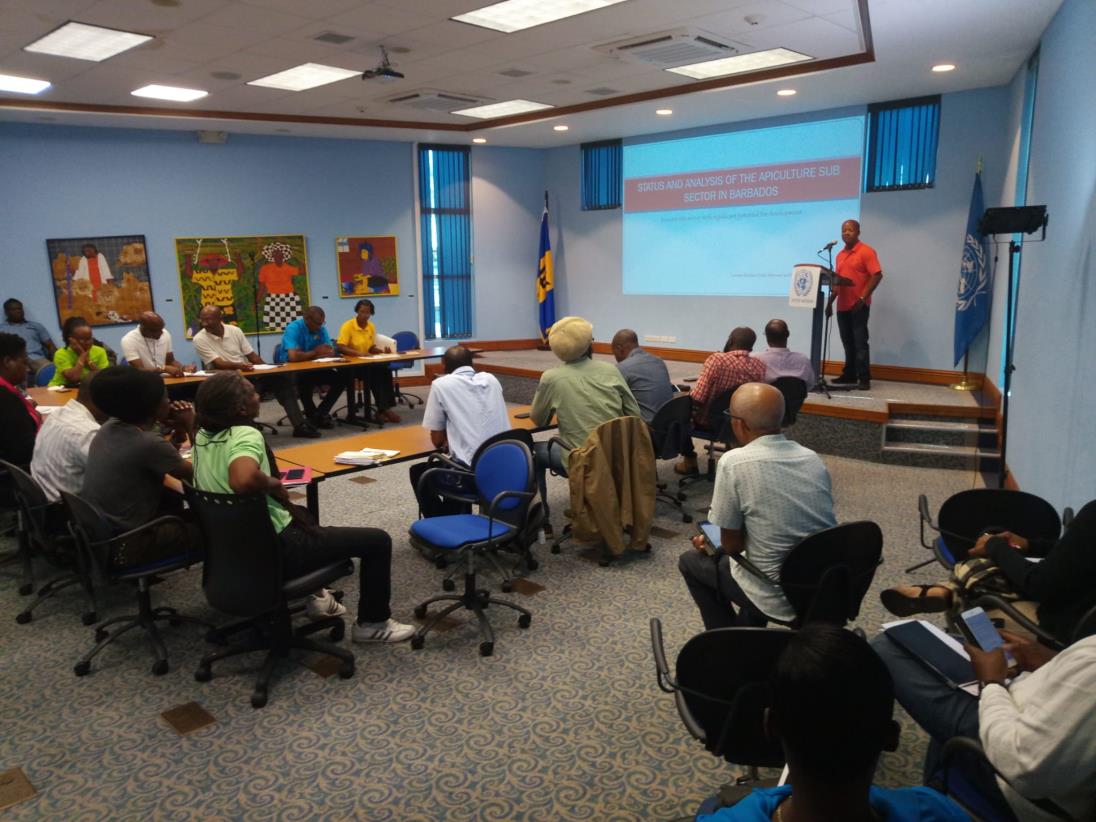Buzzing Barbados into the Honey Industry

March 14, 2020, Kingston, Jamaica – Among the best kept secrets of Barbados is its Honey, although not nearly enough is produced for local consumption. More than 96% of this sweet delight is imported, however, the country is now looking towards local production to meet the high local demand. While still in its infancy stage, Barbados is proving that it has the potential to build and sustain a lucrative honey industry as the Ministry of Agriculture and Food Security undergoes training with the Food and Agriculture Organization of the United Nations (FAO) to continue developing the Honey Value Chain.
Following months of training, on March 13, the Government of Barbados presented a Value Chain Analysis and Upgrading Strategy to over 35 beekeepers, farmers, and the public and private sector to gain their feedback. Developed by representatives from across faculties of the Government, under the guidance of FAO’s Value Chain and Agribusiness team member Bree Romuld, the analysis and strategy aimed at quantifying the opportunity to produce honey locally and strategically upgrade its production in a sustainable, competitive and resilient manner.
Lynette Rudder, Beekeeper at the Ministry of Agriculture and Food Security remarked that the training process had been quite dynamic and presented a massive opportunity for strategically developing the industry in a short time. She added that with an endorsed strategy, all stakeholders would come together to work towards a lucrative industry and that that the role of the private sector was extremely important as they could drive the industry and lower the dependence on one entity to move things forward.
According to Ms Romuld, the process undertaken by the Government was strategic in moving the sector into the next phase of its development and would open the market and promote strong and viable honey processing businesses. She highlighted that the strategy was tailored based on evidence and therefore used actual data to better understand the market and the position of all stakeholders involved in the value chain. Ms Romuld emphasized that the beauty of the analytic and strategic planning methods learnt was that they are not limited to the honey sector but could be used to build other agricultural industries.
Ms Rudder agreed that the assessment process was important in understanding the stakeholder’s needs and allowed them to identify how they could tailor the strategy to meet the needs of the industry with all aspects being covered to have a solidified industry in the future.
Endorsement of all stakeholders is crucial to the success of the value chain and in ensuring the country’s ability to increase and maintain earnings. During the meeting, Government representatives presented their results and recommendations to the stakeholders and gained their validation and national ownership of the strategy, with implementation to begin in the coming weeks.
Honey and Sweet Potato are the two value chains being developed in Barbados under FAO’s Technical Cooperation Programme on Sub-regional Capacity building in Sustainable Food Systems and Value Chain Development. Later this year, a regional workshop highlighting these and other results in Belize, Guyana and Jamaica will be showcased.
About the Sub-regional Capacity building in Sustainable Food Systems and Value Chain Development
Under FAO’s Technical Cooperation Programme, the project is geared towards institutionalizing a novel approach to value chain development. It diverts from traditional methods and focuses on an applied and participatory approach to strengthen the technical capacity of diverse and cross functional Ministry personnel to undertake the analysis themselves for improved strategic planning and implementation. This Ministry-led approach will better position Ministries to conduct their own value chain analyses, feel greater ownership over the development process and increase the marketing opportunities for priority crops and commodities. The project is expected to end in July 2020.
About FAO
The Food and Agriculture Organization of the United Nations is a Specialised Agency that leads international efforts to defeat hunger. Our goal is to achieve food security for all and ensure that people have regular access to enough quality food to lead active and healthy lives. FAO provides technical assistance through projects and programmes that meet the nations’ request for support and that align with FAO’s priority areas of work.
